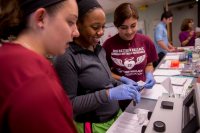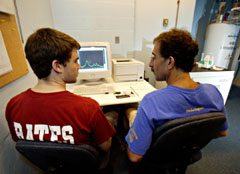
Bates receives $1.2 million in fifth Hughes Medical Institute grant
The Howard Hughes Medical Institute announced today that it has awarded Bates College a grant, Bates’ fifth from HHMI, for $1.2 million to support science education.
The grant will help fund ongoing Bates programs in student research and collaboration with schools in the greater community. The grant will also go toward new programs exploring intersections between math and the other sciences, such as mathematical modeling of physical phenomena and bioinformatics — the use of very large research databases in fields such as genomics.
“The continued support Bates receives from HHMI speaks to the extraordinary quality of our science and mathematics program,” said Bates College President Elaine Tuttle Hansen.
This round of HHMI funding totaled $49.7 million in grants to 42 institutions in 17 states and Puerto Rico. The four-year grants ranged from $500,000 to $1.6 million. Bates was among 198 institutions invited to compete for the grants.
Located in Chevy Chase, Md., the institute awarded grants to Bates in 1991, 1993, 1996 and 2000. The 2000 grant, for $1.3 million, has supported a wide range of programs at the college — from helping fund the purchase of a nuclear magnetic resonance spectrometer to supporting the science fair that Bates helps organize each year at Lewiston High School. HHMI funding fuels student and faculty research, nurtures curriculum development and encourages students to consider careers in math and science.
“It’s gratifying that efforts we think are so valuable to Bates students, faculty and the community are also considered important on a national level,” says Associate Professor of Biology Lee Abrahamsen, whose students have helped teach biology in local schools.
“It’s all about connections: connections between people, connections between what we learn in the classroom and what the real applications are, connections between learning and citizenship.”
Bates is one of nine U.S. colleges that have received five HHMI grants. The others are Carleton, Haverford, St. Olaf, Smith, Swarthmore, Wesleyan, Williams and Xavier.
In bolstering undergraduate science education, HHMI aims to help colleges and universities face a variety of challenges, such as staying abreast of emerging knowledge, strengthening interdisciplinary collaborations and encouraging minorities to pursue scientific careers.
Although its investigators conduct research at universities and medical schools, HHMI supports science at colleges because they too play a vital educational role, according to Peter Bruns, HHMI vice president for grants and special programs. “Colleges are a better learning environment for some students,” says Bruns, “and they serve underrepresented minorities extremely well.”



